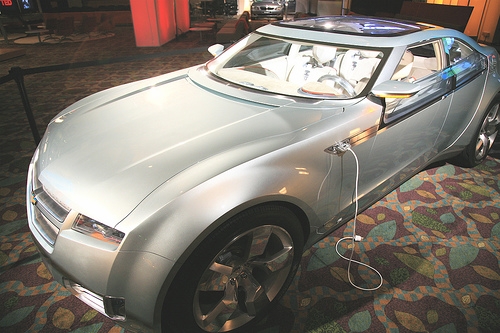
Hybrid vehicle sales haven't met market expectations so far, but experts are bullish about the future of this emerging industry. While just 2 percent of U.S. auto sales were hybrids in 2008, automotive analyst R.L. Polk & Co. expects the number of hybrids on the road to double by 2012, to 5 percent of the overall market. Governments worldwide are increasing their investment in hybrids. In 2009, President Obama announced $2.4 billion in federal grants to companies developing hybrid technology.
The most fuel-efficient gasoline-powered cars available can run at close to 50 mpg, but a hybrid passenger car modified by the National Renewable Energy Laboratory (NREL), a plug-in Toyota Prius, achieved 100 mpg for each battery charge. A study by NREL found that a plug-in hybrid electric vehicle could save an owner $450 in annual fuel costs and cut carbon emissions in half. However, Toyota executives have acknowledged that battery-powered cars won't reach a mass-market profitability until 2020 due to the costs.
Obama set a national goal of 1 million hybrids on the roads by 2015. The federal grant funds are intended to help spur competition between automakers for more affordable fuel efficient cars. General Motors received $106 million for a battery back assembly plant and $105 million for facilities to manufacture electric drive components. Johnson Controls Inc. received $299 million to make lithium ion batteries for hybrids.
The U.S. Department of Transportation offers grant opportunities to state and municipal governments to purchase public transportation buses that run on clean-fuels, including batteries, hybrid electric systems and fuel cells.
Consumers who purchase certain hybrid vehicles are eligible for a $3,400 New Energy Tax Credit (limited to 60,000 vehicles per manufacturer) from the federal government. A purchase of a plug-in hybrid electric vehicle is eligible for a tax credit of between $2,500 and $7,500.
The University of Michigan received a $2.5 million federal grant for education and workforce training on advanced hybrid vehicles and batteries. Kettering University in Flint, MI, received $2.5 million to create a new hybrid vehicle power electronics laboratory.
The European Union in 2009 approved a plan that allowed France to pump €6 million into the research and development of a green vehicle research program. Germany plans to spend $700 million on electric vehicles by 2011. China has set a goal of 5 percent of all passenger vehicles to be hybrids and battery-powered by 2011 and is providing grant funding for research and subsidies to bus companies. Japan in 2009 began offering tax breaks to consumers who purchased hybrid and electric vehicles.